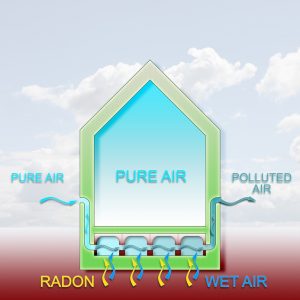 Would you knowingly purchase a home that might give you lung cancer? Of course not. And yet many people already have.
Would you knowingly purchase a home that might give you lung cancer? Of course not. And yet many people already have.
It’s estimated that approximately one out of every 15 homes in the United States contains radon levels at or above what the Environmental Protection Agency considers safe. That doesn’t mean that you have to pack up and move, though. Here’s what you need to know about radon abatement services to help protect you and your family from harm.
What is Radon?
Radon is a naturally-occurring radioactive gas. It’s odorless, colorless, and the second-leading cause of lung cancer, after smoking. Radon can be produced in soil and rocks, then it seeps into the foundation of buildings and accumulates in indoor spaces, especially basements.
How Do I Know If My Home Has Radon?
There will be traces of radon almost anywhere you go, but some areas have higher concentrations of gas in the soil than others. You can hire a residential radon testing company to determine your home’s exposure level and properly manage your risk.
What Can I Do About High Radon Levels?
You can reduce the amount of radon inside your home through radon abatement or radon mitigation services. This usually involves redirecting the radon outdoors through a vacuum, where it can dissipate through the air. Radon abatement is recommended for concentrations above 4pCi/L; it can often successfully reduce levels below 2pCi/L.
When Should I Have My Home Tested?
Radon gas testing can be completed at any time, though many new homebuyers increasingly want to have a test completed before they close on a deal. It’s recommended to test your home every two years, even if you’ve already implemented a radon abatement plan.
Nothing is more important than the health and safety of your family, which is why it’s so important to protect against this invisible gas. Radon is a serious issue, but with proper mitigation, it’s one that can be easily avoided and prevented. Most states now ban smoking inside, for obvious reasons, and it’s time to tackle the second leading cause of lung cancer.
Call your local radon testing company today to learn more about the steps you can take now to ensure a long and healthy life in your home. And if you’re looking for radon mitigation in Denver, Colorado, contact Affordable Radon Colorado for more information.

Recent Comments